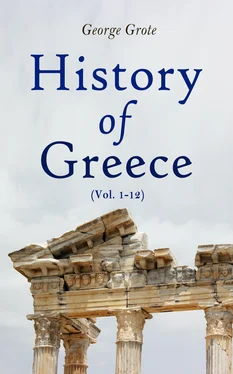George Grote - History of Greece (Vol. 1-12)
Здесь есть возможность читать онлайн «George Grote - History of Greece (Vol. 1-12)» — ознакомительный отрывок электронной книги совершенно бесплатно, а после прочтения отрывка купить полную версию. В некоторых случаях можно слушать аудио, скачать через торрент в формате fb2 и присутствует краткое содержание. Жанр: unrecognised, на английском языке. Описание произведения, (предисловие) а так же отзывы посетителей доступны на портале библиотеки ЛибКат.
- Название:History of Greece (Vol. 1-12)
- Автор:
- Жанр:
- Год:неизвестен
- ISBN:нет данных
- Рейтинг книги:5 / 5. Голосов: 1
-
Избранное:Добавить в избранное
- Отзывы:
-
Ваша оценка:
- 100
- 1
- 2
- 3
- 4
- 5
History of Greece (Vol. 1-12): краткое содержание, описание и аннотация
Предлагаем к чтению аннотацию, описание, краткое содержание или предисловие (зависит от того, что написал сам автор книги «History of Greece (Vol. 1-12)»). Если вы не нашли необходимую информацию о книге — напишите в комментариях, мы постараемся отыскать её.
History of Greece (Vol. 1-12) — читать онлайн ознакомительный отрывок
Ниже представлен текст книги, разбитый по страницам. Система сохранения места последней прочитанной страницы, позволяет с удобством читать онлайн бесплатно книгу «History of Greece (Vol. 1-12)», без необходимости каждый раз заново искать на чём Вы остановились. Поставьте закладку, и сможете в любой момент перейти на страницу, на которой закончили чтение.
Интервал:
Закладка:
Hêphæstos is the son of Hêrê without a father, and stands to her in the same relation as Athênê to Zeus: her pride and want of sympathy are manifested by her casting him out at once in consequence of his deformity. 134He is the god of fire, and especially of fire in its practical applications to handicraft, and is indispensable as the right-hand and instrument of the gods. His skill and his deformity appear alternately as the source of mythical stories: wherever exquisite and effective fabrication is intended to be designated, Hêphæstos is announced as the maker, although in this function the type of his character is reproduced in Dædalos. In the Attic legends he appears intimately united both with Promêtheus and with Athênê, in conjunction with whom he was worshipped at Kolônus near Athens. Lemnos was the favorite residence of Hêphæstos; and if we possessed more knowledge of this island and its town Hêphæstias, we should doubtless find abundant legends detailing his adventures and interventions.
The chaste, still, and home-keeping Hestia, goddess of the family hearth, is far less fruitful in mythical narratives, in spite of her very superior dignity, than the knavish, smooth-tongued, keen, and acquisitive Hermês. His function of messenger of the gods brings him perpetually on the stage, and affords ample scope for portraying the features of his character. The Homeric hymn to Hermês describes the scene and circumstances of his birth, and the almost instantaneous manifestation, even in infancy, of his peculiar attributes; it explains the friendly footing on which he stood with Apollo,—the interchange of gifts and functions between them,—and lastly, the inviolate security of all the wealth and offerings in the Delphian temple, exposed as they were to thieves without any visible protection. Such was the innate cleverness and talent of Hermês, that on the day he was born he invented the lyre, stringing the seven chords on the shell of a tortoise: 135and he also stole the cattle of Apollo in Pieria, dragging them backwards to his cave in Arcadia, so that their track could not be detected. To the remonstrances of his mother Maia, who points out to him the danger of offending Apollo, Hermês replies, that he aspires to rival the dignity and functions of Apollo among the immortals, and that if his father Zeus refuses to grant them to him, he will employ his powers of thieving in breaking open the sanctuary at Delphi, and in carrying away the gold and the vestments, the precious tripods and vessels. 136Presently Apollo discovers the loss of his cattle, and after some trouble finds his way to the Kyllênian cavern, where he sees Hermês asleep in his cradle. The child denies the theft with effrontery, and even treats the surmise as a ridiculous impossibility: he persists in such denial even before Zeus, who however detects him at once, and compels him to reveal the place where the cattle are concealed. But the lyre was as yet unknown to Apollo, who has heard nothing except the voice of the Muses and the sound of the pipe. So powerfully is he fascinated by hearing the tones of the lyre from Hermês, and so eager to become possessed of it, that he is willing at once to pardon the past theft, and even to conciliate besides the friendship of Hermês. 137Accordingly a bargain is struck between the two gods and sanctioned by Zeus. Hermês surrenders to Apollo the lyre, inventing for his own use the syrinx or panspipe, and receiving from Apollo in exchange the golden rod of wealth, with empire over flocks and herds as well as over horses and oxen and the wild animals of the woods. He presses to obtain the gift of prophecy, but Apollo is under a special vow not to impart that privilege to any god whatever: he instructs Hermês however how to draw information, to a certain extent, from the Mœræ or Fates themselves; and assigns to him, over and above, the function of messenger of the gods to Hadês.
Although Apollo has acquired the lyre, the particular object of his wishes, he is still under apprehension that Hermês will steal it away from him again, together with his bow, and he exacts a formal oath by Styx as security. Hermês promises solemnly that he will steal none of the acquisitions, nor ever invade the sanctuary of Apollo; while the latter on his part pledges himself to recognize Hermês as his chosen friend and companion, amongst all the other sons of Zeus, human or divine. 138
So came to pass, under the sanction of Zeus, the marked favor shown by Apollo to Hermês. But Hermês (concludes the hymnographer, with frankness unusual in speaking of a god) “does very little good: he avails himself of the darkness of night to cheat without measure the tribes of mortal men.” 139
Here the general types of Hermês and Apollo, coupled with the present fact that no thief ever approached the rich and seemingly accessible treasures of Delphi, engender a string of expository incidents cast into a quasi-historical form and detailing how it happened that Hermês had bound himself by especial convention to respect the Delphian temple. The types of Apollo seem to have been different in different times and parts of Greece: in some places he was worshipped as Apollo Nomios, 140or the patron of pasture and cattle; and this attribute, which elsewhere passed over to his son Aristæus, is by our hymnographer voluntarily surrendered to Hermês, combined with the golden rod of fruitfulness. On the other hand, the lyre did not originally belong to the Far-striking King, nor is he at all an inventor: the hymn explains both its first invention and how it came into his possession. And the value of the incidents is thus partly expository, partly illustrative, as expanding in detail the general preconceived character of the Kyllênian god.
To Zeus more amours are ascribed than to any of the other gods,—probably because the Grecian kings and chieftains were especially anxious to trace their lineage to the highest and most glorious of all,—each of these amours having its representative progeny on earth. 141Such subjects were among the most promising and agreeable for the interest of mythical narrative, and Zeus as a lover thus became the father of a great many legends, branching out into innumerable interferences, for which his sons, all of them distinguished individuals, and many of them persecuted by Hêrê, furnished the occasion. But besides this, the commanding functions of the supreme god, judicial and administrative, extending both over gods and men, was a potent stimulus to the mythopœic activity. Zeus has to watch over his own dignity,—the first of all considerations with a god: moreover as Horkios, Xenios, Ktêsios, Meilichios, (a small proportion of his thousand surnames,) he guaranteed oaths and punished perjurers, he enforced the observance of hospitality, he guarded the family hoard and the crop realized for the year, and he granted expiation to the repentant criminal. 142All these different functions created a demand for mythes, as the means of translating a dim, but serious, presentiment into distinct form, both self-explaining and communicable to others. In enforcing the sanctity of the oath or of the tie of hospitality, the most powerful of all arguments would be a collection of legends respecting the judgments of Zeus Horkios or Xenios; the more impressive and terrific such legends were, the greater would be their interest, and the less would any one dare to disbelieve them. They constituted the natural outpourings of a strong and common sentiment, probably without any deliberate ethical intention: the preconceptions of the divine agency, expanded into legend, form a product analogous to the idea of the divine features and symmetry embodied in the bronze or the marble statue.
But it was not alone the general type and attributes of the gods which contributed to put in action the mythopœic propensities. The rites and solemnities forming the worship of each god, as well as the details of his temple and its locality, were a fertile source of mythes, respecting his exploits and sufferings, which to the people who heard them served the purpose of past history. The exegetes, or local guide and interpreter, belonging to each temple, preserved and recounted to curious strangers these traditional narratives, which lent a certain dignity even to the minutiæ of divine service. Out of a stock of materials thus ample, the poets extracted individual collections, such as the “Causes” (Αἴτια) of Kallimachus, now lost, and such as the Fasti of Ovid are for the Roman religious antiquities. 143
Читать дальшеИнтервал:
Закладка:
Похожие книги на «History of Greece (Vol. 1-12)»
Представляем Вашему вниманию похожие книги на «History of Greece (Vol. 1-12)» списком для выбора. Мы отобрали схожую по названию и смыслу литературу в надежде предоставить читателям больше вариантов отыскать новые, интересные, ещё непрочитанные произведения.
Обсуждение, отзывы о книге «History of Greece (Vol. 1-12)» и просто собственные мнения читателей. Оставьте ваши комментарии, напишите, что Вы думаете о произведении, его смысле или главных героях. Укажите что конкретно понравилось, а что нет, и почему Вы так считаете.












